Publikace, nahrávky a jiné výstupy
Přehled toho, co jsem napsal a zveřejnil (jako sociolog) nebo nahrál a vydal (jako muzikant). Prostě veřejně dostupné "výstupy". V případě, že je to právně a technicky možné, postupně sem dávám k dispozici i plné texty a do příslušných oddílů hudební sekce pak i nějaké hudební ukázky ve formátu mp3.
KONOPÁSEK, Z. (2007): Divné řeči okolo nemravnosti. Lidové noviny, 29. 6. 2007. Dočasně dostupné na serveru Lidovky.cz
::::V tomto článku píšu o plagiátorské aféře prorektora Západočeské university v Plzni. Zdůrazòuji, že pobořující není ani tak to, že nějaký akademický pracovník kdysi podle všeho opakovaně, ba systematicky nepřiznaně opisoval z cizích textů; daleko znepokojivější jsou současné zlehčující (a jiné) reakce jeho školy a dalších akademických institucí. Dále vysvětluji, proč považuji za nemístné námitky, podle kterých je celé Budilovo obvinění nesmyslné, protože za ním stojí lidé, kteří mají s Budilem nevyřízené účty.
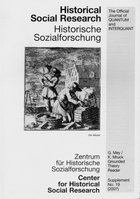
KONOPÁSEK, Z. (2007): Making thinking visible with Atlas.ti: Computer assisted qualitative analysis as textual practices. Historical Social Research, Supplement: Grounded Theory Reader (edited by Günter Mey and Katja Mruck), 19: 276-298
::::Článek se zabývá tím, jak se vlastně objevuje nová kvalita čtení, které běžně říkáme "sociologické porozumění". Vyhýbá se přitom zaužívanému metodologickému pohledu na věc, podle kterého zde hrají hlavní úlohu myšlenkové procesy a konceptuální práce. Razím zde jiný pohled, ne metodologický, ale sociologický; přesněji vzato, pohled inspirovaný současnými vědními studii (STS). Líčím kvalitativní analýzu jako soubor materiálních praktik. Na příkladu "empiricky podložené teorie" (grounded theory) a práce s počítačovým programem Atlas.ti ukazuji, že a jak je analytické uvažování neoddělitelné od praktického konání, od nejrůznějších manipulací s textem. Tvrdím, že pokud takový úhel pohledu přijmeme, lépe budeme schopni o jinak dost neuchopitelných "metodách kvalitativní analýzy" mluvit vykazatelným a návodným způsobem. Počítačové programy pro kvalitativní analýzu by z tohoto hlediska také nemusely být chápány jako "pouhé nástroje" pro kódování a vyhledávání, ale jako komplexní virtuální prostředí pro vtělené a prakticky založené poznávání. V neposlední řadě potom můžeme vidět v jiném světle i metodologii vytváření "empiricky podložené teorie": pokud ji přestaneme popisovat metodologicky-teoreticky, ale spíš jako postupy, jimiž praktického zacházení s texty dat, stane se tato údajně konzervativní a beznadějně moderní metodologická škola krásně slučitelná s radikálním konstruktivismem či post-strukturalismem.
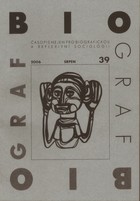
SHOVE, E. / SOUTHERTON, D. (2006): Mrazák dobře rozmrazený: Od novosti k pohodlí (příběh normalizace). Biograf , (39): 3-21 - přeložil Zdeněk Konopásek
, (39): 3-21 - přeložil Zdeněk Konopásek
::::This article examines the "normalization" of the British freezer. It defines three phases in this process: an initial period oriented around the utility of preserving home produce; a second stage marked by the development of a frozen food infrastructure and the establishment of the freezer as a part of the efficient domestic economy; and a third subtle but significant redefinition of the primary benefits of freezing in terms of convenience. Cast in their new role as "time machines", freezers are sold as a means of managing contemporary pressures associated with the scheduling and co-ordination of domestic life. At one level, this is a story of the gradual acceptance of a relatively standardized object. Yet this narrative suggests that the freezer´s promised benefits and functions change along the way. Developing this point, we argue that the normalization of the chameleon-like freezer can only be understood in the context of similarly changing systems of food provisioning, patterns of domestic practice and allied technological devices.
Translated from SHOVE, E. / SOUTHERTON, D. (2000): Defrosting the freezer - from novelty to convenience: A narrative of normalization. Journal of Material Culture, 5 (3): 301-319
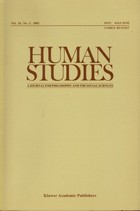
KONOPÁSEK, Z. / KUSÁ, Z. (2006): Political screenings as trials of strength: Making the communist power/lessness real. Human Studies, 29 (3): 341-362
::::In this paper we discuss the problem of communist power in so called totalitarian regimes. Inspired by strategies of explanation in contemporary science studies and by the ethnomethodological conception of social order, we suggest that the power of communists is not to be taken as an unproblematic source of explanation; rather, we take this power as something that is itself in need of being explained. We study personal narratives on political screenings that took place in Czechoslovakia in 1970 and analyze how the power of communists obtained its strength from ordinary and “unremarkable” interactions between participants. The screenings are interpreted, in the terms of Bruno Latour, as “trials of strength.” We show that it was crucial for all the participants that associations, translations or mobilizations involved in making the regime real, remained partial and multiple, and not exclusive and “total” as is often assumed within dominant discourses on totalitarianism.
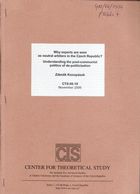
KONOPÁSEK, Z. (2006): Why experts are seen as neutral arbiters in the Czech Republic? Understanding the post-communist politics of de-politicization CTS Research Reports, CTS-06-06. Praha: CTS. Dostupné na adrese http://www.cts.cuni.cz
::::The situation in contemporary Czech Republic provides numerous examples showing that experts and scientists keep enjoying an unchallenged and privileged status of neutral arbiters, situated out of the political arena. Although comparisons between the post-communist East and (capitalist) West are always at risk of being schematic and inadequate, it seems that such de-politicized perception of science is much stronger in the Eastern Europe than in most Western European countries. Underdevelopment of STS (Science and technology studies) in the post-communist East is part of this diagnosis. Different political cultures of expertise in the “new” and “old” EU member states might even turn into sources of tension and misunderstanding on the level of particular problems and controversies. In my paper I would like to make the difference and its roots more understandable. I will discuss the political status of science under the communist regime and its implications for the development after 1989. That time, in the Czech Republic, science and expertise were to be “finally liberated” from the burden of the political, with the hope that this de-politicization would bring us closer to Western democracies. This was a huge misapprehension, however, since Western democracies were at the very same time shifting towards a kind of “re-politicization” of the realm of science and technology. Propensity toward de-politicization was further increased, again quite paradoxically, by the process of accession of the Czech Republic to the EU. This process, simply put, had the form of purely technical implementation of unquestionable measures and principles. Although my presentation will take empirical evidence and case examples mostly from the Czech Republic, it may open a more general discussion about science and expertise in other post-communist countries as well.
Paper prepared for the international workshop on Science and Democracy. A New Frontier between Eastern and Western Europe? The Nobel Museum and Södertörn University College, Stockholm, September 4-6 2006
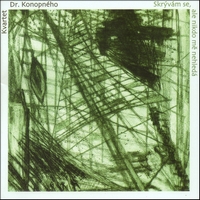
KVARTET DR. KONOPNÉHO (2006): Skrývám se, ale nikdo mě nehledá (2CD). Guerilla Records [GR 038-2]
[GR 038-2]
::::"Kvartet Dr. Konopného se se svou úhlavní osobností – jemným objemným leaderem Radomilem Uhlířem – nepochybně řadí k legendám české alternativní scény. Jeho surrealisticko-dadaistické vize, podávané velmi svébytným projevem jsou provázeny nanejvýše podivnými instrumentálními improvizacemi. Proto je soubor právem označován za jeden z nejšílenějších, jaký se v této republice vyskytoval. A proto také vychází na značce Guerilla records! Pod názvem dvojalba "Skrývám se, ale nikdo mě nehledá" se ukrývají dva stříbrné disky - archivní "Kosmický pesimismus" (74:46 min.) a aktuální tvář kapely na disku "Stíny bojovníků" (76:15 min.). Délka nahrávek svědčí o tom, že výběr je skutečně obsáhlý a vydrží vám dlouho..." (zdroj: http://www.guerilla.cz). [hudební ukázky zde]
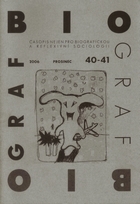
KONOPÁSEK, Z. / PALEčEK, J. (2006): V moci ďábla: Exorcismus věřícnýma očima. Biograf  (40-41): 138-171
(40-41): 138-171
::::Kritický rozbor filmu V moci ďábla (Scott Derrickson 2005). Ukazujeme, jak tvůrci rozehrávají nejednoznačnosti ohledně medicínského/náboženského vysvětlování tragického případu exorcismu. To nám umožňuje vysvětlit některé podstatné prvky našeho vlastního přístupu při výzkumu duchovních a religiozních zážitků v psychiatrii.
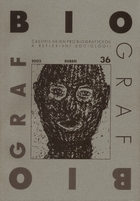
DAVID, G. (2005): Žertování o cenách v arabských koloniálech: Jak mohou citlivá témata proměňovat mezi-skupinové vztahy. Biograf , (36): 25-54 - přeložil Zdeněk Konopásek
, (36): 25-54 - přeložil Zdeněk Konopásek
::::Tensions between small immigrant-owned stores and their African-American customers are frequently cited as a major problem in large urban cities in the United States. Whereas most research has focused on the problematic nature of this relationship, the research reported in this paper attempts to focus on the positive. Rather than being plagued by tensions and problematic encounters, this paper asserts that interactions in small "convenience stores" are largely unproblematic. This paper examines the occurrence of unproblematic cross-cultural encounters as a collaborative effort between customer and worker. Specifically, this paper demonstrates how humor plays an important role in the formation of positive relationships through the analysis of "price humor". While high prices have been cited as a source of tension, this paper shows how sensitive topics, such as price, can be used by interactants to build rapport across the counter.
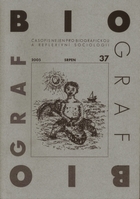
KONOPÁSEK, Z. (2005): Aby myšlení bylo dobře vidět: Nad novou verzí programu Atlas.ti. Biograf , (37): 89-109
, (37): 89-109
::::V návaznosti na recenzi z roku 1997 rozebírám novou verzi programu pro kvalitativní analýzu dat Atlas.ti (v. 5). Probírám postupně, pro koho je takový nástroj vhodný, jaké jsou základní principy analytické práce s programem a co je v této verzi programu nového. Zmiňuji také, co mi stále v programu Atlas.ti chybí a zda má smysl upgradovat z předchozí verze.
KONOPÁSEK, Z. (2005): Exploring ordinary resources of an extraordinary power: Toward ethnomethodological study of the communist regime CTS Research Reports, CTS-05-07. Praha: CTS. Dostupné na adrese http://www.cts.cuni.cz
::::Příspěvek připravený jako zvaná plenární přednáška na konferenci Mezinárodního institutu pro etnometodologii a konverzační analýzu (IIEMCA), Bentley College, Waltham, MA, USA, 6.-9. srpna 2005










